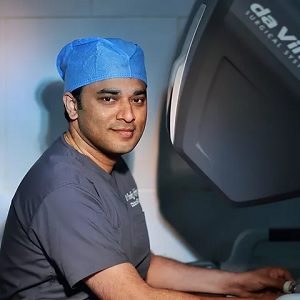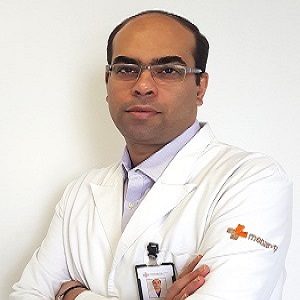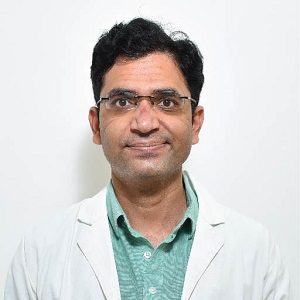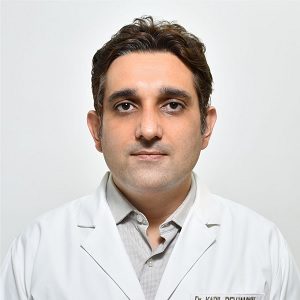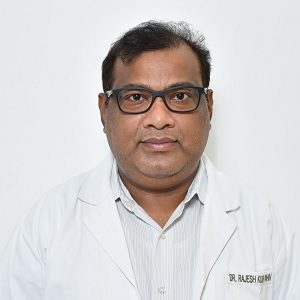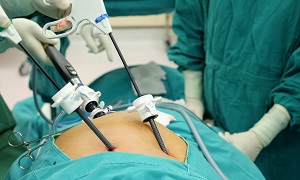Best Doctors in India for Splenectomy
- Liver Transplant Surgeon and HPB Surgeon, Chennai, India
- Over 15 years’ experience
Profile Highlights:
- Dr. Selvakumar Naganathan is one of the best liver transplant surgeons in India with nearly 15 years of experience.
- He has carried out more than 2000 procedures, including 300 donor & 500 recipient hepatectomies, cadaver transplantations, retrieval of cadaver livers, and live donor liver transplants.
- He also established many liver transplantation centers across India & other countries.
- General Surgeon and Surgical Gastroenterologist, Chennai, India
- Over 27 years’ experience
Profile Highlights:
- Dr. Raghunath K J is a well-known name in the field of general surgery with an experience of more than 27 years.
- He went under training in advanced Laparoscopic surgery from Canada and France.
- Dr. Raghunath pioneers many prestigious projects in the UK.
- Dr. Raghunath has a specialized interest in Gall Bladder Stone treatment, Hernia, GI Cancer Surgery, Laparoscopic Sleeve Resection, Endoscopic Surgery, etc.
- Colorectal Surgeon and Robotic Surgeon, Chennai, India
- Over 26 years’ experience
Profile Highlights:
- Dr. Venkatesh Munikrishnan is one of the best Gastroenterologists and Colorectal Surgeons in Chennai, having 21 years of experience in managing disorders that need surgical treatment.
- Dr. Munikrishnan specializes in surgical oncology, endoscopy, Gastritis Treatment, etc.
- He is also active in research; one of his research on CT Colonography fetched a grant from Bracco, Milan, Italy.
- GI Surgeon and Liver Transplant Surgeon, Gurugram, India
- Over 20 years’ experience
Profile Highlights:
- Dr. Amit Nath Rastogi is a pioneer in the field of liver transplant surgery. He completed his fellowship in liver transplant surgery at Sir Gangaram hospital while being a part of the largest liver transplant program in the country.
- Furthermore, he received his training in robotic liver surgery from IRCAD -Strasbourg, France, and advanced robotic HPB training from Grosseto.
- Liver Transplant Surgeon, Gurugram, India
- Over 10 years’ experience
Profile Highlights:
- Dr. Prashant Vilas Bhangui is one of the highly trained liver transplant specialists who received his training in Surgical Gastroenterology and Liver Transplantation.
- He also holds a European Inter-University Diploma in Hepato-Biliary-Pancreatic Cancers.
- Dr. Prashant is further interested to work in certain fields which include hepatocellular carcinoma, colorectal liver metastases, and living donor liver transplantation. Besides this, he has also published several journals on these subjects.
- Gastroenterologist, Gurugram, India
- Over 7 years’ experience
Profile Highlights:
- Dr. Abhinandan Mishra is one of the young Gastroenterology doctors in Gurugram who is particularly interested in inflammatory bowel disease treatment.
- Dr. Abhinandan Mishra offers Endoscopic Retrograde Cholangiopancreatography, Ascites tap, Endoscopy, Peroral Endoscopic Myotomy, Capsule Endoscopy, Esophageal Manometry, Magnetic Resonance Cholangiopancreatography, etc.
- Gastroenterologist, Gurugram, India
- Over 18 years’ experience
Profile Highlights:
- Dr. Atul Sharma is a renowned Gastroenterology practitioner in Gurugram and is particularly interested in Third Space Endoscopy and Per Oral Endoscopic Myotomy (POEM).
- He presented several papers on Manometry, Luminal gastroenterology, and interventional Gastroenterology during training in Advanced Interventional GI Endoscopy.
- Gastroenterologist, Gurugram, India
- Over 15 years’ experience
Profile Highlights:
- Dr. Kapil Jamwal is a renowned GI practitioner in Gurugram with an extensive experience in digestive and liver disease.
- The specialist offers treatment for Hepatitis B, Jaundice, Hepatitis C, Inflammatory Bowel Syndrome, Acute Pancreatitis, Liver Diseases, and Irritable Bowel Syndrome.
- Gastroenterologist, Gurugram, India
- Over 18 years’ experience
Profile Highlights:
- Dr. Rajesh Padhan is a renowned Gastroenterologist in Gurugram with an extensive experience of more than 18 years in the field.
- He is skilled in carrying out various endoscopy procedures such as Colonoscopy, Endoscopic retrograde cholangiopancreatography, Endoscopic ultrasound, upper GI endoscopy, etc.
- Gastroenterologist, Hepatologist, Gurugram, India
- Over 25 years’ experience
Profile Highlights:
- Dr. Sakshi Karkra is one of the best Pediatric gastroenterologists in Gurugram.
- She has special interest/ expertise in Colonoscopy, Upper GI Endoscopy, Capsule endoscopy, Enteroscopy, Endoscopic variceal ligation, Foreign body removal, Stricture & achalasia dilatation, Polypectomy, Anal manometry, Liver Biopsy, and Colonic manometry.
Best Hospitals in India for Splenectomy
Splenectomy
Splenectomy is a surgery for removing the entire spleen. The spleen is a delicate organ, which is about the size of your fist. It sits under the left rib cage near your stomach. This organ helps the body fight against infections, and it contains special white blood cells that can destroy bacteria. It helps in removing and filtering old red blood cells from the body’s circulation as well.
Generally, the most common reason for this procedure is for treating a ruptured spleen, which is generally caused by an abdominal injury. It is also used for treating other conditions which includes an enlarged spleen that might be causing discomfort as well as few blood disorders, a few infections, cancers and noncancerous tumors.
If only a part of the spleen is removed, then the procedure is termed as a partial splenectomy.
Purpose
Splenectomy is used for treating a wide variety of diseases and conditions. Your doctor might recommend this treatment for you if you suffer from any of the following:
Ruptured spleen- If a severe abdominal injury causes your spleen to rupture, this can lead to internal bleeding and life-threatening conditions.
Enlarged spleen- Splenectomy might also be done to ease the symptoms of an enlarged spleen, which leads to a feeling of pain and fullness.
Cancer– Cancers that are treatable with splenectomy include chronic lymphocytic leukemia, hairy cell leukemia, Hodgkin’s lymphoma and non-Hodgkin’s lymphoma.
Blood disorder- Blood disorders that are treatable with splenectomy include polycythemia vera, idiopathic thrombocytopenic purpura and thalassemia. However, splenectomy is usually recommended only if other treatments have failed to reduce the symptoms of these disorders.
Cyst or tumor- If noncancerous cysts or tumors inside the spleen become large, splenectomy might be required.
Infection- Sometimes, due to a severe infection or the development of a huge collection of pus surrounded by inflammation in your spleen, spleen removal might be required, if it doesn’t respond to other treatment.
Your doctor might also remove the spleen to help diagnose a condition. This is done when you have an enlarged spleen and he/she is unable to determine the reason.
Preparation
If your doctor finds that you are having a ruptured spleen and you show signs of massive bleeding or unstable vital signs like low blood pressure, you might need to go for spleen surgery right away.
In other cases, your doctor will require a complete physical exam, blood work and tests to look at your abdominal and chest area. The exact tests that you have will depend on your age and condition. The tests might also include an X-ray, MRI, electrocardiogram and CT scan.
You might need to follow a special liquid diet as well as take some medication so that you are able to clean out your bowels prior to your procedure. Avoid eating or drinking anything the morning of your surgery. You will receive proper instructions from your doctor.
Prior to the surgery, you will receive some drugs which will prevent bacterial infections from developing after the removal of the spleen. In some cases you might receive a vaccine.
Procedure
Right before your surgery is performed, you will be receiving a general anesthetic. The surgical team will be monitoring your blood pressure, heart rate and blood oxygen throughout the entire procedure. Heart monitors will be attached to your chest. There will also be a blood pressure cuff on your arm.
Once you are unconscious, your surgeon will begin the surgery using a minimally invasive procedure or open procedure. If your spleen is large, it is likely that your surgeon will choose to perform an open splenectomy.
Laparoscopic splenectomy
In laparoscopic splenectomy, the surgeon makes four small incisions in the abdomen. Then he/she inserts a tube equipped with a small video camera into the abdomen through one of the incisions. Your surgeon will then watch the video images on a monitor. Then the spleen will be removed with special surgical tools that are put in the other three incisions. After this is done, the incisions are closed.
Laparoscopic splenectomy is not suitable for everybody. Generally, in cases of a ruptured spleen, open splenectomy is required. Sometimes, a surgeon can start with a laparoscopic approach but later find it necessary to make a larger incision. This can be due to scar tissue from complications or any previous operation.
Open splenectomy
After the procedure
You will be moved to a recovery room after the procedure. If you undergo laparoscopic surgery, you might need to go home the same day or one day after. If you undergo open surgery, you might be able to go home after two to six days.
Talk to your doctor regarding how long you need to wait, resting at home until you can resume your daily activities. If you have had laparoscopic surgery, it might require two weeks. After open surgery, it might require around six weeks.
After the procedure, your other organs will take over most of the functions which were previously performed by your spleen. Although you still can be active without the organ, there is an increased risk of getting sick or any serious infection. This risk is usually the highest right after the surgery.
Risks
Although splenectomy is generally a safe procedure, it carries the risk of a few complications which include:
- Bleeding
- Infection
- Blood clots
- Injury to any nearby organ, which can include your stomach, pancreas and colon



